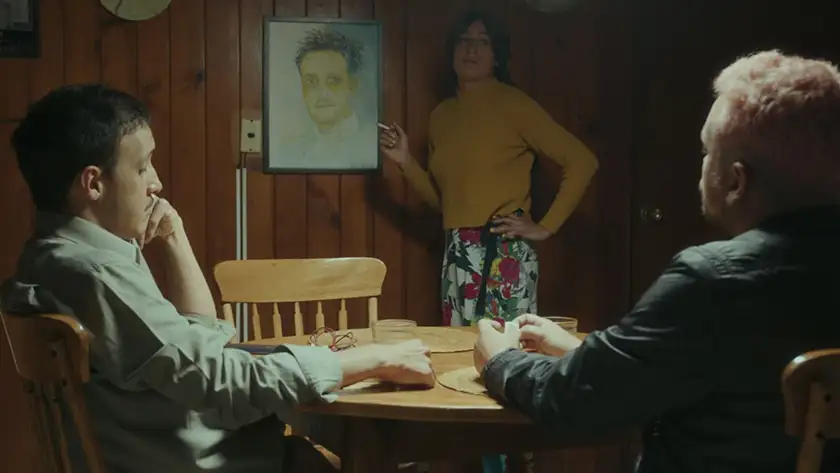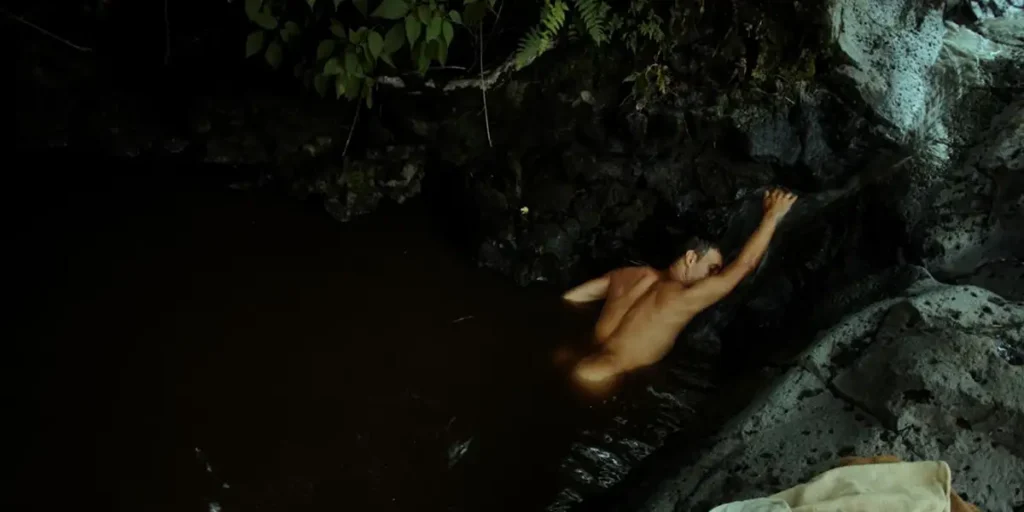Lázaro at Night, the latest creation from Nicolás Pereda, misses the mark as a dry comedy and turns into a provocative, underwhelming fantasy.
Director: Nicolás Pereda
Genre: Fantasy, Romance
Run Time: 76′
New York Film Festival Premiere: September 29-October 1, 2024
Release Date: TBA
It’s not a lack of imagination that is the pitfall of Nicolás Pereda’s newest film, Lázaro at Night (Lázaro de Noche), but rather the inconsistency of it. Pereda’s movie attempts to mix hyperrealism with masterful fantasy, but the writer-director does not have a firm enough handle on the film’s off-kilter tone to make a blend of the two concepts work.
Lázaro at Night tells the story of a love triangle between three aspiring actors: Lázaro (Lázaro Gabino Rodríguez), Luisa (Luisa Pardo), and Francisco (Francisco Barreiro). The film opens with Luisa letting Francisco in on her plans to tell Lázaro they are having an affair. The issue here is that Luisa and Lázaro have been together for years. The trio, all in their forties, have been close ever since they connected in a writing workshop they took early on in their careers. While initially interested in writing, the three evolved their interests in acting. The trio appears to not have separated since they first met, all developing an intensely intertwined, codependent relationship with one another that has now been further complicated with the affair between Luisa and Francisco.
To further disturb their lives, all three are auditioning for parts in the same low-budget movie being directed by a skeevy and pretentiously unorthodox director. Through their audition process, we learn about the personalities, aspirations, dreams and desires of all three characters as they fight to sell themselves to a director who does not deserve the importance they have placed on his approval.
While the trio met years before, all wanting to make something of themselves within the creative space, none of them have succeeded thus far. All three characters see the prospect of being cast in this film as a way to launch themselves into the life they were convinced they would one day lead. Lázaro, a betting man who lives with his mother (Teresita Sánchez), sees this as a chance to make his own money and finally stand on his own two feet. Luisa sees this as a foolproof reason to tell her mother she cannot leave the country to move in with her and work a job doing manual labor. Francisco sees this as a way to validate himself as an actor in a way that is undeniable to others.

Lázaro at Night flashes between present, past and fantasy in a way that makes the timeline of the film collapse in itself. The movie is informally broken up into these three separate parts, but there is no resolution of the storyline of the present before we move back into the past, or the past before we move into the fantasy aspect of the film. The ambiguity feels somewhat intentional, yet the structure of the film is unable to guide viewers to come to their own conclusions in a meaningful way.
Lázaro at Night is provocative in a frustrating sense. The entire film feels like it’s winking at the audience, trying to cue them in on a joke or message that it doesn’t even seem to understand. There’s a level of admiration I have for directors who really and truly desire to push the bounds of what storytelling can look like but Pereda’s vision pushes the limits of what audiences will be willing to tolerate.
While the film is determined to use unconventional storytelling in order to make grand statements about the absurdity of desire, humanness and perception of success, the audience is left to connect all of the dots the movie seems to think are beneath its surface. It’s hard to lend credibility to the deeper aspects of the film when the audience is struggling to understand what the surface level aspects of the film are even attempting to do.
The last part of Lázaro at Night veers into a modern depiction of Aladdin that Luisa had written in that fateful writing workshop the central trio met in. Luisa’s piece of work is being acted out by Lázaro and his disapproving mother and this final act of the film exists as a figment of Lázaro’s imagination. It’s meant to be a humorous depiction of humility in a world of excess, with Lázaro and his mother starving and asking the genie for food they know they will never be able to finish. Lázaro, as he has been throughout the entire film, is not in on this joke and unable to see the absurdity or lack of forethought in his wish.
There’s a message baked in this metaphor about Lázaro’s approach to life, constantly betting and biting off more than he can chew without caring about the consequences or implications of his actions. However, the power of this message is cut down by the two roughly five-minute-long scenes of his mother and him eating in dead silence, never learning their lesson. It’s the type of filmmaking risk that either plays really well or not at all and unfortunately for Lázaro at Night, the result lends itself to the latter.
Pereda’s direction leaves its audience lingering in a joke longer than it is funny for the entire film. His characters often degrade themselves, not learning from their degradations in any meaningful way, and the audience is forced to watch on. Something about this aspect of his directorial style is reminiscent of Yorgos Lanthimos and his signature directorial tone. But, where Lanthimos has solidified this employment of tone, Pereda seems to continue to struggle with it.
Lázaro at Night is not an easy film to digest. Its radical shifts in genre without a clear indication of tone from Pereda making it a jarring film to try and dissect. By the end of the runtime, there are more questions than there are answers and an even worse understanding of what the film was truly trying to say in its own convoluted way.
Lázaro at Night was screened at the New York Film Festival on September 29-October 1, 2024.

